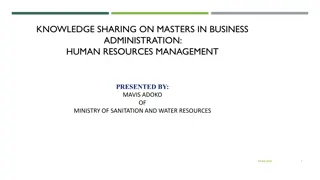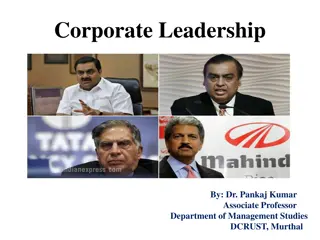Comprehensive Overview of Leadership Theories and Styles
Leadership encompasses the ability to influence a group towards achieving goals by knowing oneself, communicating vision, building trust, and taking effective action. Various leadership styles include Autocratic, Democratic, Free-Rein, and Paternalistic, each with distinct decision-making approaches and member dependencies. Theories of leadership explore traits, behaviors, contingencies, and situational factors that influence leadership strategies. Traits like personality, extraversion, conscientiousness, openness, and emotional intelligence play key roles. Behavioral theories focus on leader behaviors such as initiative, consideration, employee orientation, and production orientation. Contingency/situational theories emphasize the blend of a leader's style with situational control for effective leadership.
Download Presentation

Please find below an Image/Link to download the presentation.
The content on the website is provided AS IS for your information and personal use only. It may not be sold, licensed, or shared on other websites without obtaining consent from the author. Download presentation by click this link. If you encounter any issues during the download, it is possible that the publisher has removed the file from their server.
E N D
Presentation Transcript
LEADERSHIP Leadership is the ability to influence a group toward the achievement of goals. Leadership is a function of knowing ones self, having a vision that is well communicated, building trust among colleagues, and taking effective action to realize ones own leadership potential.
TYPES OF LEADERSHIP STYLES LEADERSHIP STYLES DECISIONS MAKING STYLE RESULTS APPLICATION MEMBERS DEPENDENC Y LEVEL AUTOCRATIC No chance for suggestions / opinions from others High High Alienation & Demotivation Quicker Members are not experts High level of control DEMOCRATIC Consultative & Persuasive Moderate High Team Effectiveness & Motivation for new ideas Slower, Members are equally efficient High involvement FREE-REIGN Shared Responsibility Independence High motivation, Self-monitoring, Good Team & Interpersonal relations Creative ideas are the core business No need for close monitoring PATERNALISTI C Makes Self- decisions & Rarely Consults Moderate Welfare & Supportive Work Environment Policy Formulations Members unaware of own strengths
THEORIES OF LEADERSHIP Traits Theories Behavioral Theories Contingency / Situational Theories Transactional Theories Transformational Theories and Charismatic Theories of Leadership
THEORIES OF LEADERSHIP (Contd.) Factors determining leadership strategies of Traits based Leaders Trait Theories of Leadership Considers personality, social, physical, or intellectual Extraversion traits to differentiate Conscientiousness Openness Emotional Intelligence
THEORIES OF LEADERSHIP (Contd.) Behavioral Theories of Leadership Factors determining leadership strategies of Behaviour based Leaders Specific differentiate leaders from non-leaders. behaviors Initiative Consideration Employee orientation Production orientation Development orientation
THEORIES OF LEADERSHIP (Contd.) Contingency / Situational Theories of Leadership Factors determining leadership strategies of Contingency based Leaders Blend of a leader s style and the degree to which the situation gives control and influence to the leader. Leader-Member relations Leader delegate readiness to Follower readiness to accept responsibilities Task structure Positional power
THEORIES OF LEADERSHIP (Contd.) Transactional Leadership Theories of Factors determining leadership strategies of Transaction based Leadership: Guides followers in the direction of established goals by clarifying role and task requirements. or motivates the Management by reward Management by Exception Laissez-Faire
THEORIES OF LEADERSHIP (Contd.) Transformational Theories of Leadership Factors determining leadership strategies of Transformation based Leaders (4 I s): Adopts approaches using the 4 I srather than a conventional transactional approaches transformational or Idealized Influence Inspirational Motivation Intellectual Stimulation Individual Consideration
THEORIES OF LEADERSHIP (Contd.) Theories of Charismatic Leadership Followers attributions of heroic extraordinary leadership when they certain behaviors. Factors determining leadership strategies of Charismatic Leaders or Self Confidence Visionary abilities observe Being a change agent Environmental sensitivity & needs of the followers Willingness personal risks to achieve the vision. to take
Definition of Motivation Motivation - the process of arousing and sustaining goal-directed behavior.
Nature Motivation is internal to man. A single motive can cause different Behaviour Different motives may result in single behaviour Motives come and go Ongoing process Complicated process
Importance To keep employees happy To instill human treatment To increase work efficiency To improve communication To combine ability with willingness To reduce the rate of labour turnover To develop the leadership quality
Maslows Hierarchy of Needs C:\Documents and Settings\bergmama\Application Data\Microsoft\Media Catalog\Downloaded Clips\cl4f\j0199813.wmf SA Esteem Love (Social) Safety & Security Physiological
Alderfers ERG Theory Growth SA Esteem Relatedness Love (Social) Safety & Security Existence Physiological
Herzbergs Two-Factor Theory Hygiene Factor - work condition related to dissatisfaction caused by discomfort or pain maintenance factor contributes to employee s feeling not dissatisfied contributes to absence of complaints Motivation Factor - work condition related to the satisfaction of the need for psychological growth job enrichment leads to superior performance & effort
MotivationHygiene Theory of Motivation Motivation factors increase job satisfaction Company policy & administration Supervision Interpersonal relations Working conditions Salary Status Security Achievement Achievement recognition Work itself Responsibility Advancement Growth Salary? Hygiene factors avoid job dissatisfaction SOURCE: Adapted from Frederick Herzberg, The Managerial Choice: To be Efficient or to Be Human. (Salt Lake City: Olympus, 1982). Reprinted by permission.























